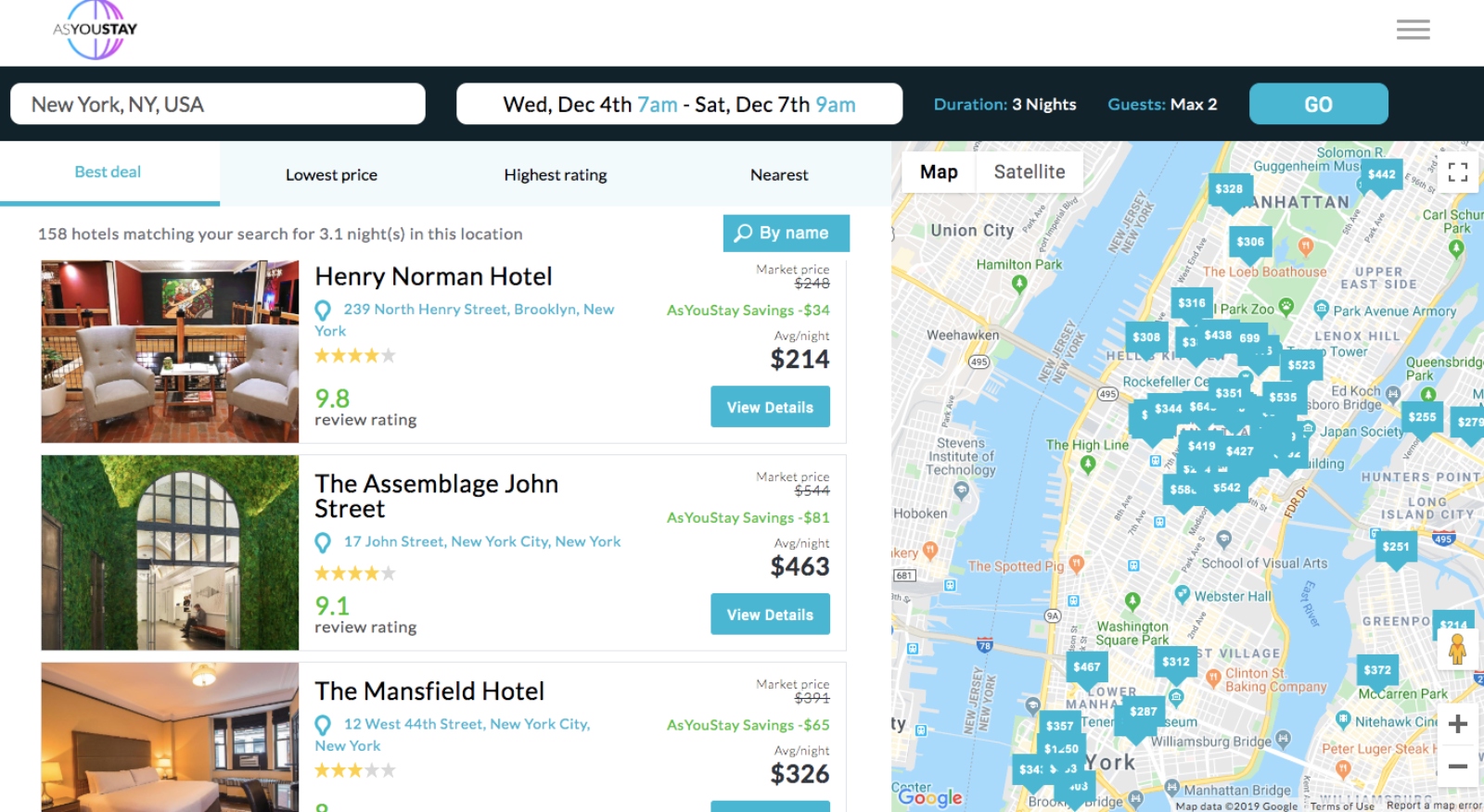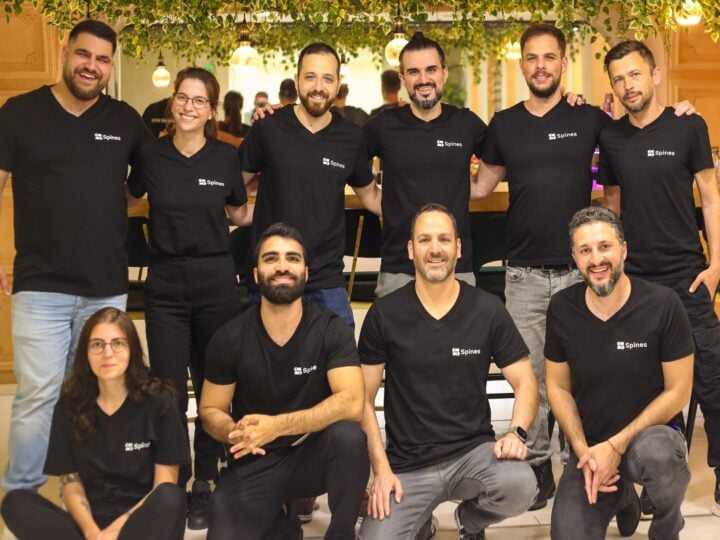Your flight arrives at 8am but check-in time at your hotel is not until 3pm. Or your flight home is not until 11pm, but check-out is at 11am.
Ofer Helfman gets your frustration. The Israeli founder of startup As You Stay has worked in the hospitality industry for nearly 15 years. He saw travelers’ pain up front while managing WooGo, a forerunner to Airbnb.
“I just didn’t see a reason why, when we travel, and we come with different schedules, we have to wait until 3pm to get into our room or get kicked out by 11am,” he says.
“You have people who have just traveled for 12 hours and are dying to take a shower but can’t. So we said, ‘Let’s solve it.’”
Like any online travel site, As You Stay’s website and mobile app ask you to input your destination and dates. But it also allows you to specify the hours you’ll be arriving and departing. The site then displays hotels that have availability matching your requirements and displays the prorated price.
“If the price of the room is $200 a night, then the additional amount for a half day would be around $60 to $80 – not a price that would make it unattractive,” Helfman explains.

He and his team initially approached hotels individually to recruit their participation.
“We went hotel by hotel in Manhattan,” Helfman says. “We got some great brands on board. But it didn’t work. You need to have enough supply and demand to feed each other. We had 100 hotels in New York, Los Angeles and Miami, but that was too lean and we couldn’t scale up.”
As You Stay then tried a different approach. “We buy rooms from a wholesaler in bulk and do the optimization ourselves,” Helfman explains.
What that means is that if a traveler needs to checkin at 5am, As You Stay books the room from the night before. Yet the traveler only pays the prorated price from the morning.
As You Stay can do that because it grabs the rooms at a low rate from the wholesaler and keeps the commission that would normally go to a middleman like Priceline or Agoda.
“We won’t buy a room unless it’s economical and we know we can sell it. Everything is done automatically. We want to create a three-way win-win-win” between the hotel, the wholesaler and As You Stay, Helfman adds.
For now, only non-refundable standard rooms are offered, and you cannot extend an existing stay at a prorated hourly rate. However, that may eventually change.
A ‘travelution’
For the moment, As You Stay is less concerned about maximizing profit and more interested in educating the market that it’s both possible and desirable to adjust prices based on the number of hours a traveler stays.
“It’s a ‘travelution,’” Helfman quips. “We’ll reduce our commission, so the customer and hotel are happy.”
He is confident it will balance out in the end “because the customer will come back to us instead of another site next time. In three years’ time, people will forget how it used to be done.”
After all, other aspects of the travel business have changed radically. “You can still flag down a yellow cab in New York City, but it’s better to order it via your phone,” Helfman points out.

As You Stay opens new opportunities without requiring hotels to change their reservation systems.
For example, data about when guests are coming and going could give hotel managers the ability to stagger cleaning schedules.
“If you need to clean 30 rooms a day and you only have three to four hours to do it, it affects the quality of the cleaning,” Helfman says, having seen that himself while working in the industry.
“I’ll let you in on a secret: The cleaning is never finished on time. And if there’s chaos with the cleaning, there’s chaos with the front desk. Think about the line that’s created when everyone is asked to come at 3pm.”
If a guest has committed not to check in until 7pm, however, cleaners can work later. And the current occupant could stay in the room longer, generating additional revenue for the hotel.
Playing with the big boys
The nine-person startup, launched in 2016 with less than $1 million from angel investors, has entered an industry dominated by Expedia (which owns Travelocity, Orbitz and Hotels.com, among others) and Priceline (which has Booking.com, Kayak and Agoda in its stable of companies).
But Helfman believes that if you give customers convenience and savings, they’ll make the shift. (One incentive is the As You Stay Loyalty Program, offering a $50 credit for every 100 hours stayed.)
In the long run, he envisions As You Stay working directly with the giants. “We can’t fight Booking.com or Expedia,” he says. “Expedia makes two million reservations a day. We’re a startup. So, we say, ‘Let’s join them.’”
Booking.com and its owners at Priceline typically “don’t kill competing companies,” Helfman says. “They buy them and put them under a bigger umbrella.”
As You Stay already buys most of its room inventory from Booking.com, so they have a working relationship. “They are watching us to see what happens,” Helfman notes.
Thanks to As You Stay’s partnership with Booking.com, the Tel Aviv-based startup offers access to a million rooms in 100,000 hotels. Most are in the United States. Europe and Asia (including Israel) began coming on board last summer.
As You Stay has no direct competitors, Helfman claims. Websites such as Hotels by Day– which recently expanded service to Tel Aviv — help hotels maximize unused inventory during daytime hours.
Helfman started As You Stay while he was living in New York. Hemoved the business, and his family, to Tel Aviv in 2017. “We wanted our kids to grow up here,” he explains.
Moreover, travel businesses can be run entirely online. “We have customers from Iraq and Lebanon. We have software developers in Kiev and Buenos Aires,” he points out.
Israel’s strong travel-technology ecosystem includes close to 300 startups. (Here are 10 of our favorites.)
“There are so many ideas in Israel,” Helfman says. “I served in the army as an officer in a special unit and we were trained to always think out of the box, to chase after something even if it doesn’t work. The fact that everyone is going to the left doesn’t mean it’s right. Israelis aren’t afraid to be different.”
For more information, click here

















